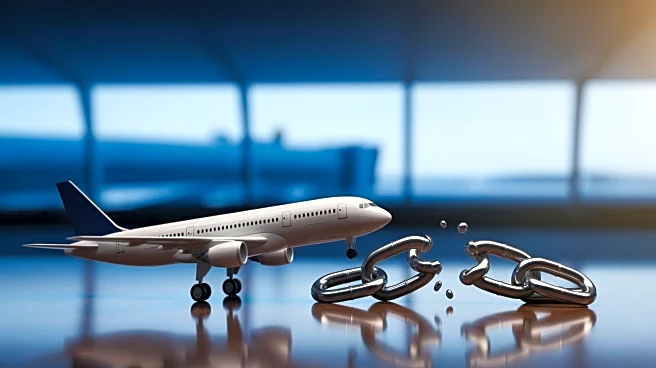What's Happening?
United Airlines CEO Scott Kirby has expressed concerns over the potential impact of the ongoing U.S. government shutdown on airline bookings and flight operations. The shutdown, now in its third week,
stems from a political impasse over government funding, exacerbating a persistent shortage of air traffic controllers. This has led to occasional slowdowns in air traffic in certain cities. Despite the majority of air traffic controllers continuing to work, Kirby warns that prolonged uncertainty could erode public confidence in the government's ability to resolve the situation, potentially affecting travel bookings. United Airlines has reported a decline in unit revenue in both domestic and international markets, attributed to operational issues and weaker pricing power.
Why It's Important?
The extended government shutdown poses significant risks to the aviation industry, particularly in terms of operational efficiency and consumer confidence. With over 13,000 air traffic controllers and 50,000 TSA officers receiving partial paychecks, the potential for increased absenteeism could disrupt flight schedules and airport operations. This situation could lead to financial losses for airlines, as travelers may opt to delay or cancel trips due to uncertainty. United Airlines, facing a decline in unit revenue, is particularly vulnerable as it navigates operational challenges and attempts to maintain pricing power. The broader impact on the travel industry could be substantial, affecting related sectors such as tourism and hospitality.
What's Next?
United Airlines plans to address its capacity issues by adjusting its summer schedule next year, including reducing seats during peak travel periods like the July Fourth holiday. The airline also intends to keep its transatlantic capacity flat to negative in the third quarter of 2026. These strategic adjustments aim to improve margins and stabilize revenue. Meanwhile, the resolution of the government shutdown remains uncertain, with potential implications for air travel and broader economic activities. Stakeholders, including airlines and travelers, are likely to closely monitor developments in Washington for signs of a compromise that could restore normal operations.









